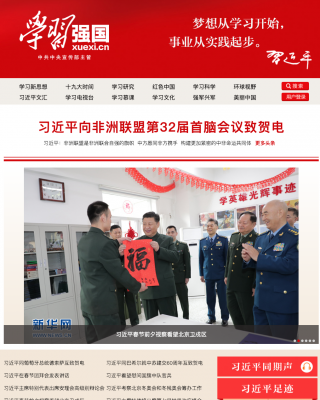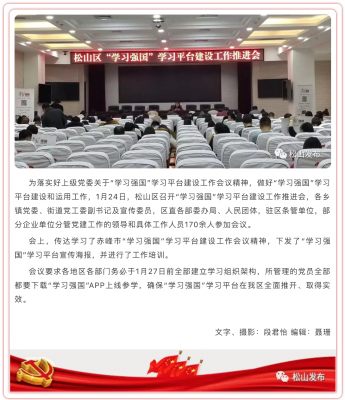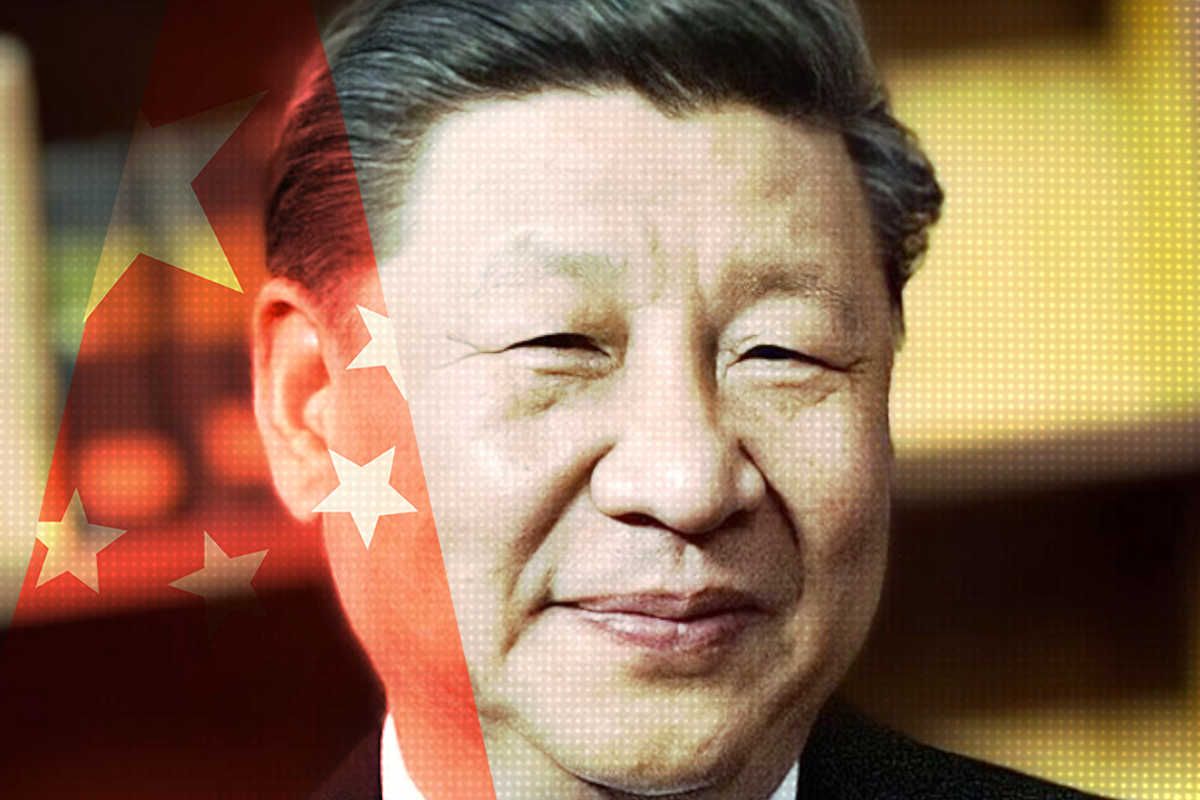Headlines and Hashtags
The Dawn of the Little Red Phone
On January 25, all seven members of China’s elite Politburo Standing Committee, including President Xi Jinping, gathered at the headquarters of the flagship People’s Daily newspaper to underline the importance of “convergence media” and digital media development as a means of strengthening the Party’s dominance of ideas and information.
Xi Jinping told those present that the Party “must utilise the fruits of the information revolution to promote deep development of convergence media.” The objective was to “build up mainstream public opinion” — meaning, of course, Party-led public opinion — and to “consolidate the shared ideological foundation underpinning the concerted efforts of the entire Party and all the Chinese people.”
As we wrote at the time, Xi’s stilted and jargon-filled speech was essentially about the Party finding new ways to reengineer its dominance over the realm of ideas in the face of dramatic changes to the media environment brought on by the digital revolution. But what exactly does this mean in practice? How can, and how will, the Party leverage digital technology to re-program propaganda in the 21st century?

Already this year we have witnessed one product that provides at least part of the answer, a prime example of how the Party can leverage digital media products to reshape the whole process of ideological control in ways that are far more personal, and far more effective, than anything we have witnessed in the reform era. “On New Year’s Day, many Party members and cadres found to their delight that ‘Xi Study Strong Nation,’ an authoritative and content-rich platform especially for theoretical study, had formally been launched,” the official People’s Daily reported on January 15.
Skirting past this questionable assertion about the delight Party members have derived from this new app, what exactly are we talking about here?
Available at the website xuexi.cn, the “Xi Study Strong Nation” app is tool by means of which, once installed, the Party can assert its ideological and intellectual authority over Party members and employees of Party-run institutions, including schools and media. Beyond making Party messages passively available, as Party newspapers and state controlled media have done for decades, the app commands engagement, by which users can earn “Xi Study Points” (学习积分). Once engagement with the app is enforced by administrative demands that it be installed and used, something that is already happening, the messages of the Party become inescapable.
Gone are the days when you can simply ignore that stack of Party newspapers in the corner of the office, or switch off the Party’s nightly newcast, “Xinwen Lianbo.“
The app’s name, “Xi Study Strong Nation,” or Xue Xi Qiang Guo (学习强国), is derived from a now widely used official pun on the surname of China’s top leader. The surname “Xi” is also the second character in the Chinese word xuexi (学习), meaning “to study.” The app, designed and built by the Propaganda and Public Opinion Research Center of the Central Propaganda Department of the CCP (中共中央宣传部宣传舆情研究中心), an office previously known as the “Research Center on Ideology and Political Work” (思想政治工作研究所), is organised into several sections. These include, to name just a few, “Important News” (要闻), “New Thought” (新思想) and “Summary of Current Politics” (时政综合), all aggregating the speeches and statements of Xi Jinping, as well as audio and video content.
The platform has been designed with a built-in “Xi Study Points” system (学习积分系统) that allows users to accumulate points on the basis of habitual use of the platform, from reading and viewing of content to the posting of comments and other forms of engagement. It has been widely promoted by local governments and ministries and departments across China, and there have also been reports that some work units have ordered employees to attain specified point levels, with disciplinary measures to be imposed for those who fail to comply.
Here is one post to the official WeChat account of the district of Songhan (松山), in the Inner Mongolian city of Chifeng (赤峰), that reports on a “work training” for 170 Party and government employees on the “Xi Study Strong Nation” app.

According to the post from Songshan, offices and departments at all levels in the district were tasked with fully implementing study mechanisms by January 27, so that “all Party members under [district] jurisdiction download the ‘Xi Study Strong Nation’ app and go online to take part in studies, ensuring the full uptake of the ‘Xi Study Strong Nation’ study platform in our district.”
The app is obviously also about promoting the dominance of the ideas and policies of Xi Jinping as the “core” of the Party, and marks a continued push toward the reification of these ideas under the banner of “Xi Jinping Thought” (习近平思想). An introduction to the platform at Sohu.com reads:
“Xi Study Strong Nation” is an authoritative study platform designated by the Central Committee of the Chinese Communist Party for [use by] Party members and cadres, organised and built by the Central Propaganda Department, and covering all Party members and office workers across the country. The platform’s chief content consists of Xi Jinping Thought of Socialism With Chinese Characteristics for the New Era and the spirit of the 19th National Congress of the CCP, gathering together a mass of freely available reading materials, from periodicals, ancient works and open courses, to songs, dramas, films, books and other materials. Its study materials are authoritative, accurate, rich and vivid.
The platform is interesting and significant not only for the nature of its content as reflective of a renewed push to enforce the dominance of the Party’s ideology and positions, and to consolidate the power of Xi Jinping around the developing notion of “Xi Jinping Thought,” but also for the way it reinvents the process of ideological dominance for the digital era.
This is most evident in the points system employed by the “Xi Study Strong Nation,” the way it is engineered to make demands, in actionable and measurable ways, on how Party members spend what might otherwise be considered their personal time.
The idea is that users of the platform earn points through their active engagement with the material, so that more time on the platform rewards more points. Reading one article earns you 0.1 points. Watching a single video earns you 0.1 points. And a full 30 minutes of either reading articles or viewing video content earns you a full 1.0 points. The beauty of digital media technology — disquieting for those who care about privacy and freedom from intrusion — is that our smart apps know a great deal about our actual behaviour. This means that “Xi Study Strong Nation” (and by extension the Party) cannot be bamboozled into awarding points in the absence of real engagement, meaning that you will have to not just open an article or video but will have to stick with it. The app will know if you’ve only viewed the first paragraph, or if you’ve moved away from the video. If you want to earn points (and you are probably now required to), you will have to devote your full attention to the Party.
Consider how the “Xi Study Strong Nation” point system is engineered and you realise that the advancement of the platform is about the real and measurable engagement, and thereby domination, of the individual within the broader Party-led system.
The app defines several periods of activity as “lively intervals,” or huoyue shiduan (活跃时段), during which users engaging with the platform can earn double points — 0.2 for each article or video, 2 points for a full 30 minutes of use, and so on. The intervals are Monday through Friday from 8:30 PM to 10 PM, and on Saturdays and Sundays from 9:30 AM to 10:30 AM, and 3:30 PM to 4:30 PM. The system, then, incentivises Party members, once home from the office and done with family dinner, to spend golden hours of otherwise discretionary personal time engaging with “Xi Jinping Thought.”
The platform also places upward limits on points that can be earned on a daily basis from certain activities. For example, users can earn 0.1 points by commenting on an article, but commenting can earn only a maximum of 0.2 points per day. So only two comments per day will be rewarded. This means in practice that to earn points users have to engage more broadly with the platform across content categories, and it is not possible to simply do a Saturday binge in order to pile up points. The app means that anyone required to download and use it must be regularly engaged and active.
This has very real implications at the personal level. In a post to the social networking site Douban last month, a post since deleted (archived here), one user talked about how her mother, a teacher at a small town school, had been required to earn a minimum of 40 points a day on the “Xi Study Strong Nation” app. This particular user was not familiar with the new app until they noticed on a trip home during winter break that their mother, typically not a habitual smartphone user, was spending a great deal of time glued to the screen.
When I went home over winter break, I discovered that my mom, who generally didn’t use her mobile so much, was on it every single night, and even would not sleep until late into the night (while she generally was asleep by 10PM). I found this really strange, and only after I asked about it did I learn that the education committee at the subdistrict level had ordered teachers at all schools to download an app called “Xi Study Strong Nation,” and to earn points by fulfilling various tasks every day.
For the writer’s mother, the demand from education officials had already become taxing. Not a digital native, the poor woman could only diligently apply her time after work hours, wading endlessly through the prepared materials on “Xi Jinping Thought.”
“Mom is already approaching 50, her eyes aren’t so good anymore, and for someone so unfamiliar with how to use a smartphone earning 40 points was for her an extremely difficult thing,” the user wrote with concern. “Moreover, this app makes quite total demands on one’s time, and by nature is extremely intrusive, so that it’s virtually impossible to operate it simultaneously while one reads a book or otherwise relaxes.”
As with anything in China, there are possible workarounds, and these have already been the topic of some discussion on Chinese social media. In the Douban piece, the writer introduces a “plan” for their mother — potentially of utility to others — that includes a number of possible cheats by which the overtaxed users of the “Xi Study Strong Nation” app might earn points more efficiently. For example, by ensuring their mobile screens are timed to lock out only after at least 10 minutes of inactivity (meaning that it will not seem that they been inattentive while the app is open). But “Xi Study Strong Nation” illustrates and underscores, nevertheless — for even circumvention demands engagement — the potential of the smartphone as a tool through which authoritarian regimes can shape and reinforce dominance over the population.
Like “The Little Red Book” of the Mao Zedong era, “Xi Study Strong Nation” puts the core thought of the supreme leader in the palm of your hand. But the book has been revolutionised. It now interacts with you, and takes the measure of you. It can determine just how “smart” you are when it comes to your devotion and your grasp of the ideological essentials.
Long live the digital dictatorship.





















